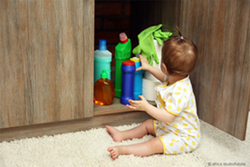With poisoning, don't panic

In case of poisoning a hasty or wrong action can be more dangerous than the actual poisoning.
The red berries were so tempting to the little girl that she had to try them. What happened next is all too familiar to the staff of the Poison Information Center at the Medical Center – University of Freiburg. Using her finger, the mother attempted to induce vomiting. But in the process she injured the child's throat and caused bleeding. In addition, this mechanical stimulation affected the vagus nerve, behind the palate wall, in such a way that the child momentarily became unconscious.
"This case provides an example of how a hasty or wrong action can be more dangerous than the actual poisoning," reports Dr. Maren Hermanns-Clausen, Director of the Poison Information Center at the Medical Center – University of Freiburg. Because the berry that the girl had swallowed was quite harmless, and after brief treatment in the hospital she was able to go home again.
What to do in case of poisoning?
"The most important thing in case of poisoning is, as in all emergencies, to remain calm," says Hermanns-Clausen, who along with her colleagues had to deal with over 25,000 telephone inquiries about poisoning last year. Especially when children swallow a toxic substance or plant, the parents often panic and react wrongly.
After a poisonous substance is swallowed, at most one glass of still water, diluted juice or tea should be drunk. The idea that the poison should be ejected from the body as quickly as possible by vomiting is also wrong: "On no account should vomiting be triggered, because corrosive substances may further damage the esophagus. In addition, these substances can then more easily get into the airways and damage the lungs."
Dr. Hermanns-Clausen further advises not drinking salt water, since that in itself can cause poisoning. And drinking milk helps the poison more than your body: the milk's fat content may in some circumstances increase the uptake of poison.
Eliminate sources of danger
The Poison Information Center has been affiliated with the Center for Pediatrics at the Medical Center – University of Freiburg for nearly 50 years, and has been responsible for all of Baden-Württemberg for more than 15 years. The majority of poisoning call cases are for children up to the age of five. Children up to the age of 15 are poisoned mainly by household products. "Children most commonly swallow cleaners, out of curiosity, especially machine and manual dishwashing detergents," says Dr. Hermanns-Clause.
Medicines also frequently lead to poisoning, but plants of all kinds have an especially magical allure for small children: more than 80 per cent of plant poisoning cases in children involve one- to four-year-olds. Above all, children prefer plants with colorful berries such as cherry laurel, yew, privet or physalis. Benjamin's fig tops the list of most-swallowed houseplants.
But even adults poison themselves with plants. "Wild garlic leaves for example can be confused with those of the autumn crocus and lily of the valley, which are extremely poisonous," warns Hermanns-Clausen.
Back